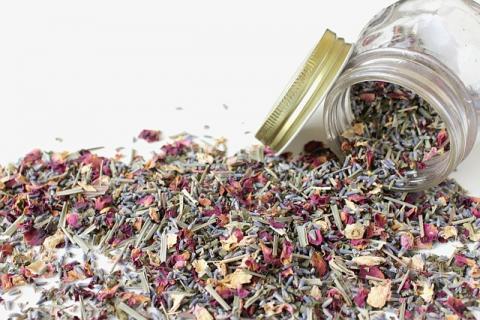
Taking deep breaths and putting your head between your knees doesn't always work for those wonderful, anxious moments. Stress-related ailments are more common than ever in our fast paced technology driven society. But, the good news is, there are lots of ways to get your chill on – and most methods are pretty cheap and easy to implement into a daily routine. These 5 herbs will calm your parasympathetic nervous system (or “fight or flight response”) and help you chill right out.
Lavender
Lavender can easily brighten up a room with its sweet, floral scent with herbal undertones. It's a pretty popular scent and is most commonly added to toiletries like soap, shampoo, face wash, and body lotion. Taken orally, lavender has been proven to decrease symptoms of anxiety and depression as compared to a placebo test. Lavender has even proven to be just as or more effective than benzodiazepenes and SSRIs, and is less habit-forming than both of these types of drugs, making it ideal for those with addictive tendencies. Lavender is especially great to use for aromatherapy and can enter the bloodstream via your nose by simply smelling its soothing scent. It's pretty amazing actually to think that simply burning a lavender candle or diffusing its oil can have a direct effect on your mood and mental well-being.
Chamomile
This is one of my favorite herbs for calming down, especially after a long day. It's a super effective sleep aid. I usually make a concentrated tea of 2-3 bags so I get a higher dose if I want to make sure I have a restful sleep that night. Its fresh, herbal, sugary-fruity scent is cheery and bright and when diffused will fill any room with a calming and relaxing tone. Chamomile is extremely popular as an herbal sedative, and is most commonly taken as a tea. But you can also purchase chamomile capsules and oil for medicinal use – these are often stronger and will give you a more thorough treatment. Chamomile has been proven to reduce symptoms of anxiety and in a study reduced anxiety of participants by 50%, as compared to another group that took placebos. Diffusing chamomile oil can also reduce headaches and relax muscles, which are two common symptoms of anxiety.
Peppermint
Peppermint is slightly sweet and incredibly cooling. It seems that not everyone is a fan of diffusing peppermint oil into the air – it can smell a little medicinal and a little too cooling. But, peppermint is extremely popular as a tea and as an addition to meals/dishes. You can add chopped mint to salads, smoothies, iced teas and soups – taken this way it will still reduce anxiety levels, plus it will make your dish taste delicious! Peppermint has been shown to reduce anxiety. It can also treat an upset stomach (caused by anxiety), headaches and nerve pain. Peppermint is also an effective muscle relaxant, targeting muscular nerves and helping them relax. You could also apply peppermint oil topically in the form of an ointment or to help open up airways during an anxious episode.
Passionflower
Passionflower is popular amongst the natural remedies community as a strong and potent anxiety treatment. Passionflower increases gamma amino butyric acid or GABA in the brain, reducing excitability of neurons, which actually mirrors the treatment process of benzodiazepenes. What's interesting to note is that passionflower can give off the same mental effects as marijuana, making it a mild psychoactive (very mild!). In addition to treating anxiety, passionflower is effective as a narcotic, sedative and sleep-aid. Since this herb is quite strong, take precautions before taking it and consider its side effects of dizziness, confusion, irregular muscle action and confusion, altered consciousness, and inflamed blood vessels.
Magnesium
This one isn't so much an herb as it is a mineral; something that we can find in our food everyday. But lots of people don't realize that the conventional food that's grown today only contains a fraction of the magnesium that we actually need -- that's why supplementing is so important. This mineral plays an important role in supporting your nervous and musculoskeletal systems, and because of that can directly affect your mental health. Magnesium helps balance calcium in the body and prevents calcium from toxifying your body. For those under severe stress, magnesium stores are often used up, causing a magnesium deficiency and causing the cycle of anxiety to be self-perpetuating. Taking magnesium can also relax your muscles and create a feeling of balance and calm in your body, which in turn helps reduce that “fight or flight” response we're all so familiar with.








